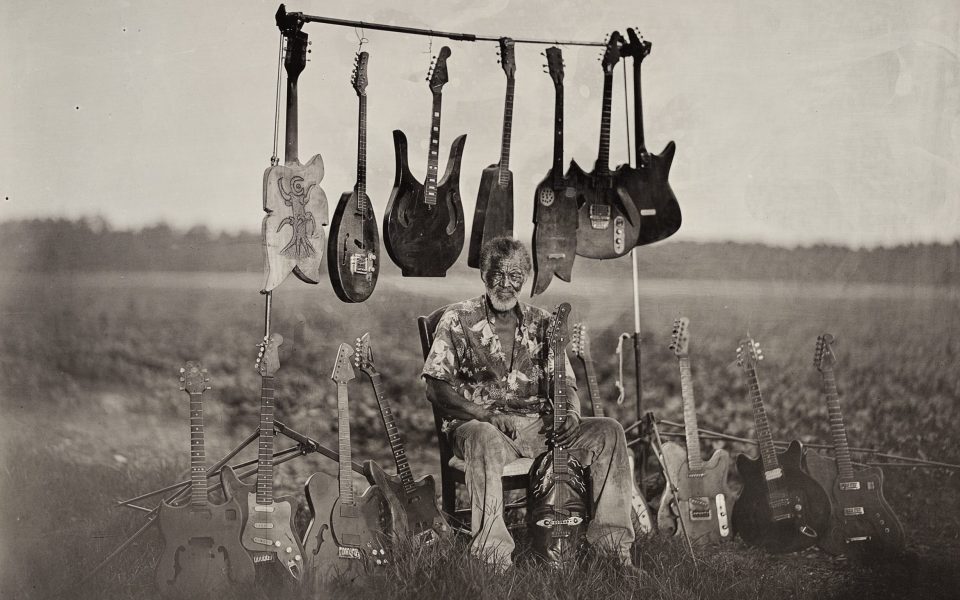Artist Freeman Vines was retrieving unwanted wood from neighbors to create guitars when he came across the story of Oliver Moore. He tells the story matter-of-factly, like he could be commenting on the summer heat. As he was loading his truck with the sawed remnants of a walnut tree, his neighbor gave him a warning.
“He said, ‘Vines, you might not want that wood right there,’” he recalls. “He said, ‘A man was hung on that tree.’ I didn’t pay it no mind.”
Vines’ distinct drawl is pure Eastern NC flatland. The wrinkles on his dark weathered face are an indecipherable roadmap, but his eyes possess a bonfire of intelligence, creativity, humor.
Years later, the guitars dangle from strings at different heights, hung by their necks and rotate gently in the artificial breeze. The sturdy branch mounted above the gallery floor from which they hang erases any illusions about what the instruments are supposed to represent.
“The strangest thing happened,” says artist Freeman Vines. “There was stuff in that wood that made me think a boy was crying out.”

Hanging Tree Guitars is SECCA’s newest exhibition and an eye-opening experience featuring Vines’ work. The exhibition, on view until Sept. 12, features a series of tintypes, hand-carved wooden sculptures and handmade guitars by Vines. A number of the pieces in the exhibit were made from the tree used in a lynching in 1930.
Oliver Moore was a 29-year-old farm worker who was lynched after being abducted from the Tarboro Jail by 200 white men. Charged with attempted rape, reports differ on the events that led to Moore’s arrest. None of the men involved in the lynching were brought to trial.
Tim Duffy, a photographer and founder of the Music Maker Relief Foundation, was collaborating with Vines on the series of tintypes that would later be a part of the exhibition when Vines began to work with the wood from the walnut tree. Together, they began to uncover Moore’s story.
In an area where Klan presence and racism is still prevalent, Vines was initially concerned about pursuing the story, because to bring up old demons carries a risk of ramifications, most notably from the descendants of the people responsible for Moore’s death. The white families still live in the state, side by side with the same Black families who worked for them decades ago.
But Vines believes that using that fear and pain in art can create dialogue.
“I learned pain,” Vines says. “Sometimes pain is a friend of yours.”
Growing up in rural, eastern NC, Vines’ early life was one of labor, struggle and racism. Working as a field hand on tobacco farm, pay was mostly nonexistent and to ask for it would invite violence.
In his book, co-authored by Duffy and folklorist Zoe Van Buren, Vines compares his early life to slavery.
“[It was] worse,” Vines writes. “Because see, you had the idea that you were free, and you weren’t.”
Relying on creativity and expression has been an escape from trauma and in Vines’ case, a catharsis. While much of that has been through visual art, Vines also has a background in music.
Initially, the artist says he began making guitars so he could craft his own sound.
“The first guitar I ever made was a slab of wood with some strings on it,” says the 79-year-old artist, luthier, musician and storyteller.
His guitars, like his vision, are varied and unique. All are made by hand.
“The saw has a mind of its own,” says Vines. “The jigsaw would not follow the way I had drew the shape of the guitar. When I get through cutting, it’s a guitar but different than the other ones.”
These days, his experimental use of capacitors from old radios, discarded wood from old barns, soundboards from thrown away pianos are all a continued attempt to form a unique sound that is his, and his alone.
One of Vines’ guitars is played on a track, “Somewhere to Lay My Head,” performed by Johnny Ray Danielson the accompanying album, Hanging Tree Guitars, that Music Maker produced for the exhibition and book release.
The track opens with Daniels’ gruff voice over a chorus of joyous gospel singers.
“I’ve got trials and tribulations / I’ve been ‘buked and I’ve been scorned / I’m hoping soon my trials will be over / And I want… / Somewhere (somewhere to lay my head),” sings Daniels.
The track, while jubilant in nature, seems to echo Vines’ life of hardship and struggle. But unlike the song repeats, the artist suggests he’s not quite ready to retire yet. He says he’ll keep his health in check and work in his barn when he has time.
“80 years old, I just do basic stuff,” Vines says. “I don’t abuse the [health] problem. You can’t run no more.”
Freeman Vines: Hanging Tree Guitars is on view at SECCA until Sept. 12 at SECCA. Visit Secca.org to learn more. Watch the short film about Vines produced by the Music Maker Foundation here.
Join the First Amendment Society, a membership that goes directly to funding TCB‘s newsroom.
We believe that reporting can save the world.
The TCB First Amendment Society recognizes the vital role of a free, unfettered press with a bundling of local experiences designed to build community, and unique engagements with our newsroom that will help you understand, and shape, local journalism’s critical role in uplifting the people in our cities.
All revenue goes directly into the newsroom as reporters’ salaries and freelance commissions.


Leave a Reply